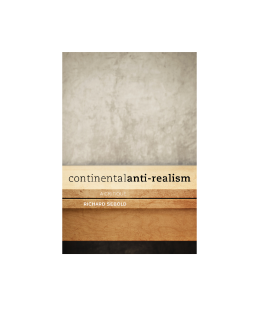
Additional Information
Book Details
Abstract
There has been a resurgence of interest in the problem of realism, the idea that the world exists in the way it does independently of the mind, within contemporary Continental philosophy. Many, if not most, of those writing on the topic demonstrates attitudes that range from mild skepticism to outright hostility. Richard Sebold argues that the problem with this is that realism is correct and that the question should then become: what happens to Continental philosophy if it is committed to the denial of a true doctrine?
Sebold outlines the reasons why realism is superior to anti-realism and shows how Continental philosophical arguments against realism fail. Focusing on the work of four important philosophers, Kant, Hegel, Nietzsche, and Husserl, all of who have had a profound influence on more recent thinkers, he provides alternative ways of interpreting their apparently anti-realist sentiments and demonstrates that the insights of these Continental philosophers are nevertheless valuable, despite their problematic metaphysical beliefs.
Sebold's book perceptively explores the fertile ambiguity of some famous continental philosophers on the question of realism. Controversial but compelling, it is a must read, especially in concert with emerging trends in speculative realism.
Jack Reynolds, Professor of Philosophy at Deakin University, Melbourne
Richard Sebold has a PhD in Philosophy from La Trobe University, Australia.
Sebold puts a strong case for philosophical realism via some acute and highly critical though not ungenerous readings of the anti-realist (mainly 'continental') opposition. While focusing on Kant, Hegel, Nietzsche and Husserl his account is also shrewdly angled toward a swathe of present-day thinkers and movements. His basic line of argument - that anti-realists are often (thankfully) to be found making covert realist commitments - is well taken and merits close attention from those of that persuasion. Sebold's book should indeed, as he hopes, help to move things along and reframe the very terms of current debate on this topic.
Christopher Norris, distinguished research professor at Cardiff University, Wales
